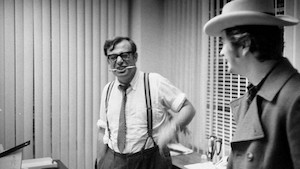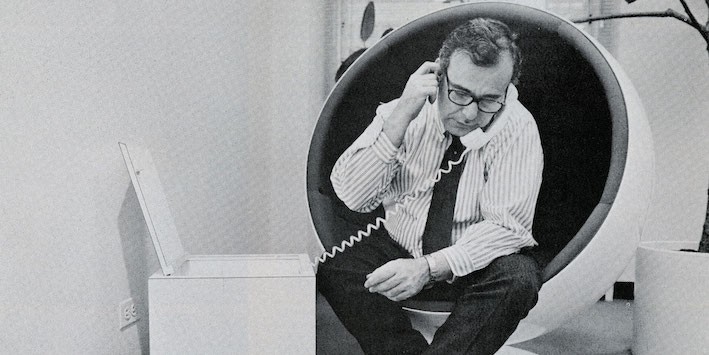Out of the Past, Into the Future: Professor Ira Deutchman
Out of the Past, Into the Future is a bi-weekly series that aims to chronicle a limitless scope of work by Columbia filmmakers representative of the past, present, and future. This series investigates how Columbia film projects, and the bespoke stories therein, are enmeshed with tales of history and experience, and harbingers of what’s to come.
This week we sat down with Professor Ira Deutchman to discuss how a bygone era in independent filmmaking was codified in his recent documentary, Searching for Mr. Rugoff.
Through poignant narrative and anachronistic footage, historical documentaries are capable of chronicling extrinsic circumstances of the time period they investigate, often in intuitively veristic ways, bringing viewers on a quest with an enigmatic figure of the past. Professor Ira Deutchman’s film, Searching for Mr. Rugoff, which premiered last fall at DOC NYC, is one of these honest and gripping documentaries, which engages viewers through memoir and interviews. Searching for Mr. Rugoff chronicles the raucous tale of an unsung hero, Donald Rugoff, who transformed independent film exhibition and distribution during the late 1960s and 70s with his company, Cinema 5, until he unexpectedly disappeared. With suited use of archival footage and commentary, it is a tribute to a time in the 20th century when frequenting movie theaters was commonplace, and as Deutchman recounts, perhaps more earnest than it is today.
“It’s historically significant to me,” said Deutchman of his film, “I would hope that it felt to be historically significant for cinephiles, who may or may not be aware of the history behind it. In the larger sweep of history, I’m not sure people would consider it that.” According to Deutchman, most people would not know Rugoff today. “He didn’t try to become a public figure, or try to seek out press attention in the way that many producers do today. The other part of it is that those who finish at one company find, almost invariably, a second or third act of reinventing themselves or starting at a new company, and in Rugoff’s case, he really did just disappear.”
Still from Searching for Mr. Rugoff
At the age of 26, Donald Rugoff helmed his father’s business, a chain of Nickelodeon's established in the 1920s. Soon after, he launched Cinema 5 on the Upper East Side as the premiere art house theaters in New York City. Between 1965 to 1978, Cinema 5 received 25 Oscar nominations and six wins, most of them for foreign films and documentaries. When Rugoff left Cinema 5, he essentially vanished into nonrecognition. After he lost a battle with shareholder William Forman, Rugoff renounced the company, and for the final years of his life he lived in obscurity on the island of Martha’s Vineyard, where he formed a local cinema society in an old church. Nonetheless, Rugoff had made his mark on independent film.
Cinema 5 is known for releasing such films as Z, Swept Away, Seven Beauties, Putney Swope, Scenes From a Marriage, Monty Python and the Holy Grail, Pumping Iron, The Man Who Fell to Earth and numerous other avant-garde, art-house films. The company also owned several prestigious theaters in New York, including Cinema I and II, the Beekman, the Plaza, the Paramount, the Gramercy and the Sutton, among others. Today, most of these theaters have been sold and transformed for other purposes, but some remain.
Deutchman, who worked for Rugoff after graduating from college, remembers him as a browbeating, eccentric genius, but he came to know his exalted first boss through the indie movies he was screening. “When I was in high school, I was living in New Jersey, and Rugoff’s theaters were in Manhattan, and as a budding cinephile, I often went to those theaters. I absorbed the films he would screen which became a large part of my sensibility. When I was in college, I was in charge of a film society called “Midnight Madness,” and it was on Friday and Saturday nights at midnight. We would show these more offbeat kinds of films, and clearly it was influenced by the movies that Rugoff was showing and in fact I started booking films from Cinema 5, so I showed films like Putney Swope, Gimme Shelter, and Greaser’s Palace."
“When I graduated and I was looking for a job, I started calling up some of the people that I knew in the film industry and one of those people was someone who worked for John Cassavetes and they told me that they had a job available as a salesperson at Cinema 5. So I ran over there, and interviewed with Rugoff himself, and that was the first first time I heard the man’s name. I got the job and ended up there.”
Today still, Rugoff’s work in exhibition and distribution indirectly informs companies like A24 and others, who are attempting to take movies, which one would think of as being independent films, and broadcast them to as large an audience as possible. “There’s a direct lineage of producers in a sense,” Deutchman said, “because so many of the people who worked for Rugoff went on during the 80s and 90s to run independent companies.” Deutchman is among those who went on to have a successful career in independent film distribution and marketing, founding Cinecom, Fine Line Features, and later, Emerging Pictures. Throughout his career, Deutchman has spearheaded the publicity and distribution of such groundbreaking and commercially successful independent films as The Last Metro, Lili Marleen, Short Cuts, Sex, Lies, and Videotape, Hoop Dreams, The Player, and A Room With a View.
“On a very practical level, Rugoff taught me that you should never assume anything, and basically what that meant to me was that just because something is true once, does not mean that it will be true again, and that was something that I absorbed as part of my personal ethos. On a more aesthetic, marketing level, I think I absorbed a lot of his taste—the simplicity of the advertising he would do.”
Searching for Mr. Rugoff tells the story of its own making. Deutchman had a good relationship with Rugoff—whenever he planned to take his career in new directions, Rugoff promoted him. The work he did in marketing and distribution at Cinema 5 polished his cinematic taste and cultivated a moxie distribution expertise, which encouraged Deutchman to make brave, artistic choices throughout his career in film marketing and distribution. After Rugoff disappeared, Deutchman couldn’t consign his old boss to oblivion. He told countless stories of Rugoff’s idiosyncrasies, such as the drool marks he indelibly left on paperwork. “I was left with the most vivid impression of food being delivered left and right, and then it would be dripping out of his mouth all over papers on his desk. I used to joke that the only way people would know that Rugoff had signed a check was that there would be drool on the check next to his signature.”
When friends suggested that he write a book about Rugoff, Deutchman started searching for more material about him, and he found a dearth of information, prompting him to pursue the making of the film, which features interviews with people around the world. In telling the tale of Donald Rugoff, he discovered a profound story about the experience of going to movie theaters, and the precepts bestowed by Rugoff on the modern era of film marketing.
“In retrospect, at the time that Rugoff was working, in the late 1950s into the 60s and 70s, was a time when the movie business was struggling, which had a lot to do with the invention of television and the concern that television would inhibit whatever theatrical audience there was,” Deutchman said. “That’s incredibly relevant when you talk about the streaming world doing almost exactly the same thing. I suppose it is a lesson for all of us that there is no signing the death warrant of theatrical moviegoing, because there has been stress on it for many years, and Rugoff is one of those people who, looking back, was kind of a hero who saw opportunity in movie marketing. The success of Parasite this year reminded me of the kinds of things that Rugoff used to do.”
Read more from the "Out of the Past, Into the Future" series


